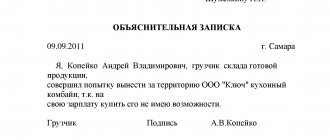1. Embezzlement or embezzlement, that is, theft of someone else's property entrusted to the guilty person, is punishable by a fine in the amount of up to one hundred twenty thousand rubles or in the amount of the wages or other income of the convicted person for a period of up to one year, or by compulsory labor for a period of up to two hundred and forty hours, or correctional labor for a term of up to six months, or restriction of liberty for a term of up to two years, or forced labor for a term of up to two years, or imprisonment for the same term.
2. The same acts committed by a group of persons by prior conspiracy, as well as causing significant damage to a citizen, are punishable by a fine in the amount of up to three hundred thousand rubles or in the amount of the wages or other income of the convicted person for a period of up to two years, or by compulsory labor for a term up to three hundred sixty hours, or correctional labor for a term of up to one year, or forced labor for a term of up to five years with or without restriction of freedom for a term of up to one year, or imprisonment for a term of up to five years with restriction of freedom for a term of up to one year or without it.
3. The same acts committed by a person using his official position, as well as on a large scale, are punishable by a fine in the amount of one hundred thousand to five hundred thousand rubles or in the amount of the wages or other income of the convicted person for a period of one to three years, or deprivation of the right to hold certain positions or engage in certain activities for a term of up to five years, or forced labor for a term of up to five years with or without restriction of freedom for a term of up to one and a half years, or imprisonment for a term of up to six years with a fine of up to ten thousand rubles or in the amount of wages or other income of the convicted person for a period of up to one month or without it and with or without restriction of freedom for a period of up to one and a half years.
4. Acts provided for in parts one, two or three of this article, committed by an organized group or on an especially large scale, are punishable by imprisonment for a term of up to ten years with a fine in the amount of up to one million rubles or in the amount of the wages or other income of the person convicted of a period of up to three years or without it and with restriction of freedom for a period of up to two years or without it.
Misappropriation and embezzlement: basic concepts
These are 2 different options for theft of property handed over for storage. Transferred property is objects that a person had the right to dispose of in accordance with an agreement or resolution of public or government bodies.
Appropriation is the taking of property transferred to the perpetrator without the permission of the owner. Embezzlement is the illegal actions of a person who transferred property to other persons or spent property without obtaining the consent of the owner. Examples include waste of maternal capital, survivor's pensions, and guardianship payments.
In order to convict a person, the court must establish the fact of the suspect’s selfish intent.
The corpus delicti under Article 160 of the Criminal Code of the Russian Federation
The object of a criminal act is equated to the object of theft and represents a property relationship. The subject of the criminal act is the property transferred to the accused person, that is, the property for which the person has acquired certain powers.
The reasons for the emergence of such powers are as follows:
- GPC agreements (lease agreements, supply, transportation, storage agreements);
- labor and service relationships;
- special rights and powers.
Property is not transferred if a person did not have authority to dispose of it, if it was looked after by a random person, or if it was transferred into custody. Secret theft is punishable in accordance with Art. 158 of the Criminal Code of the Russian Federation. Theft differs from embezzlement in that the thief illegally takes property from the owner, and the “appropriator” receives the rights to dispose of the property on legal grounds, and then uses the property for selfish interests.
There are two options for carrying out the crime in question:
- performing a certain action (a person uses the property transferred to him for storage at his personal discretion);
- failure to commit an action (a person evades returning property, keeps it in his possession).
The corpus delicti is material. The appropriation ends when the culprit has received rights to property and began to commit acts of profit for personal benefit. Embezzlement ends when there is illegal expenditure of the issued property.
The characteristics of the subject of these crimes are as follows:
- age over 16 years;
- existence of financial liability for property;
- the presence of documents that prove the fact that the owner entrusted his property to the criminal.
If a crime is organized by a group of persons, then the perpetrators face criminal punishment in accordance with Art. 33 and 160 of the Criminal Code of the Russian Federation in the form of assisting persons, instigators or organizers.
- Incitement is the inducement by a person of another person to commit a crime. Methods can be very different - persuasion, threat, bribery.
- Complicity - facilitating a crime through recommendations, instructions, provision of information, weapons, methods of removing obstacles. In addition, an accomplice becomes a person who intended in advance to hide information about who the perpetrator was, how the crime was committed (or to buy and sell illegally obtained property).
It is necessary to prove in court that the subject of the embezzlement/embezzlement had selfish personal plans and direct intent. The latter is aimed at causing property damage to the injured party. This is facilitated by the achievement of selfish plans: they are expressed in the form of a desire to use property that does not belong to oneself for one’s own purposes in order to obtain property benefits.
Statute of limitations
The limitation period for criminal cases is established by Article 78, according to which the limitation period for a crime is:
- with general characteristics (Part 1 of Articles 158 and 159 of the Criminal Code of the Russian Federation) = two years;
- moderate severity (part 2 of articles 158 and 159 of the Criminal Code of the Russian Federation) = six years;
- with special qualifying characteristics in accordance with parts 3 and 4 of articles 158 and 159 of the Criminal Code of the Russian Federation = ten years.
The calculation of the limitation period begins on the day after the commission of the crime.
We talked in more detail about how the statute of limitations for theft is determined here.
Appropriation and embezzlement: similarities and differences
Appropriation presupposes the illegal possession of property objects, and embezzlement involves their use in selfish plans in the form of alienation, exploitation, and expenditure.
All cases of embezzlement and misappropriation are examined for intentional intent. The prevailing circumstances are established, including whether the accused has the opportunity to return the property to the owner, or attempts to hide the crime committed through forgery.
There is an opinion that embezzlement is a consequence of the appropriation of issued property. For selfish exploitation of property, the first step is to decide not to return it to the owner. At the same time, judicial practice does not contain cases of application of such an approach: otherwise, a similar theft would have two moments of completion - at the end of appropriation and embezzlement.
Embezzlement and embezzlement differ in that at the time the crime was completed, the property was in the hands of the accused. At the end of the appropriation, a person could dispose of property that did not belong to him, and at the end of the embezzlement, he brings this opportunity to life. Lawful possession and unlawful detainment of property have no interconnected period of time during which the accused was unlawfully in possession of the property.
Differences
Appropriation is considered as one of the options for theft of property that does not belong to the offender. Other offenses include theft, fraud, robbery, etc. The key differences between the various types of property crimes aimed at taking someone else's money or property are as follows:
- a basic sign of misappropriation or embezzlement of someone else’s property under Art. 160 of the Criminal Code of the Russian Federation is illegal actions with entrusted assets or money, i.e. the criminal initially received them on a legal basis by the direct will of the owner;
- theft implies the secret seizure of property, in which the proper owner not only does not consent to such an action, but in most cases does not even know about it;
- robbery consists of open theft, when the owner of money or assets is forced to part with property under the threat of violence, the use of weapons or other types of illegal behavior;
- robbery is a direct attack on the owner of property, committed with the aim of stealing and converting other people's money or assets into one's own property;
- Fraud means the illegal taking of other people's money, things or objects under the influence of deception, abuse of trust and other actions not related to violence.
Note!
The distinction and distinction between various types of theft is established not only according to the norms of the Criminal Code of the Russian Federation, but also according to the guiding clarifications of the Supreme Court of the Russian Federation. In particular, the appropriation of someone else's property is also disclosed in the provisions of judicial practice - Resolution of the Plenum of the Armed Forces of the Russian Federation dated December 27, 2007 No. 51 distinguishes between appropriation, embezzlement and fraud.
The law on appropriation of someone else's property also provides for enforcement measures under the Civil Code of the Russian Federation, since the owner has the right to demand the return of things or money from the illegal possession of other persons. To do this, a statement of claim may be filed in the district court, and when considering a criminal case, a claim may be filed, including for damages.
Thus, determining the following circumstances will be of key importance when investigating misappropriation cases:
- whether the property came into the possession of the offender legally;
- whether violence, threat, deception or other illegal actions were used against the owner, the purpose of which was to seize other people’s things or finances;
- whether the retention was unlawful;
- whether the offender had selfish motives.
Sale of someone else's property for selfish purposes Art. 160 of the Criminal Code of the Russian Federation is considered embezzlement. Personal consumption of entrusted property (for example, food products), as well as spending money on one’s own needs, is also considered a crime.
Article 160 of the Criminal Code of the Russian Federation on the illegal appropriation of someone else’s property provides for the following types of punitive sanctions:
- under part 1 - a fine of up to 120 thousand rubles; compulsory, correctional or compulsory work; imprisonment for up to two years;
- under Part 2 (if a preliminary conspiracy is established, or significant damage is caused) - similar penalties, and imprisonment can be up to five years;
- under Part 3 with major damage may be punishable by up to six years;
- Part 4 (especially large scale, or participation in an organized group) - imprisonment can be up to 10 years.
To bring to justice under Art. 160 of the Criminal Code of the Russian Federation does not matter what assets ended up in the hands of the criminal, however, determining the amount of the stolen property may differ significantly depending on the type of property.
Features of fraud under embezzlement
Fraud involves a violation of the trust of the injured party, which is expressed as follows: a fraudster with selfish plans establishes a trusting relationship with the owner of the property or with a person who has the authority to transfer this property to other people.
There are various circumstances that determine trust - family relationships with the injured party, the official position of the accused, and others.
The classification of theft is established if there was a relationship between the owner and the attorney that was recorded legally. As a result, the main difference between fraud is that it presupposes that the criminal is in a legal relationship with the owner of the property, which is based on trust.
In addition, the legislation contains the term “arbitrariness”. This is the seizure, conversion to personal interests or interests of other individuals of someone else's property by a person who intended to exercise an alleged or existing right to this property. For example, a person appropriated the issued property, planning to repay the debt of the owner of this property. Arbitrariness should not be confused with theft. The culprit faces punishment in accordance with Art. 330 of the Criminal Code of the Russian Federation.
What is state property?
The Civil Code of the Russian Federation reveals the concept of state property in Article 214. This is property that belongs by right of ownership to the Russian Federation and its constituent entities, as well as lands and natural resources that are not owned by individuals, legal entities and municipalities.
State property is assigned to state enterprises, which can own, manage and use it. Funds are distributed among budgets and form the state treasury.
Qualification of a criminal offense
The qualifying feature is causing financial harm to the injured party. The amount of damage starts from 2.5 thousand rubles.
In order to determine its presence, the judge will need to establish:
- the actual price of the disputed property;
- the financial condition of the injured party, expressed in the amount of earnings, the frequency of their receipts, the presence of needy disabled family members, as well as the total income of the entire family.
The court takes into account the owner’s testimony about the amount of damage caused, materials and evidence of the case being studied - they confirm the value of the stolen property and indicate the financial condition of the victim.
If the total cost of property theft was 250 thousand rubles or more, then this is theft on a large scale. A particularly large amount is misappropriation and embezzlement of property from 1 million rubles. In such conditions, the punishment will be maximum. It is necessary that the criminal commit all the thefts in the same way, provided there are circumstances that prove his selfish intent.
What punishment is established under Art. 160 of the Criminal Code of the Russian Federation
Possible types of liability are indicated in the table
| Crime | Possible types of punishment |
| Illegal use of budget funds | Fines from 120 thousand rubles (or the amount of the perpetrator’s earnings for the year), compulsory labor for up to 24 hours, corrective labor for up to six months, ban on free movement for up to 2 years, forced labor for up to 2 years, prison for up to 2 years |
| A crime carried out by a group of persons under a prior agreement, resulting in significant harm | Fines up to 30 thousand rubles (or the amount of the perpetrator’s earnings for 2 years), compulsory labor for up to 360 hours, corrective labor for up to a year, forced labor for up to 5 years, a ban on free movement for up to 1 year, prison for up to 5 years. If the theft of property occurred on a particularly large scale, then the punishment is as follows: fines up to 1 million rubles (or in the amount of the perpetrator’s earnings up to 3 years), prison up to 10 years |
| Crime based on illegal use of official powers | Fines from 100 to 150 thousand rubles (or in the amount of the perpetrator’s earnings for 3 years), a ban on certain activities/positions for up to 5 years, forced labor for the same period, a ban on free movement for up to one and a half years, prison for up to 6 years |
Article regulating the theft of state property
In the Criminal Code of the RSFSR, in force until January 1, 1997, separate articles were provided for theft and other types of theft of state property.
The current Criminal Code does not distinguish between state and private property. Responsibility for the theft of property owned by the state comes under Articles 158 – “Theft”, and 159 – “Fraud”.
How to defend yourself in court
A person who is suspected of the crime in question can use the following methods to defend himself in court:
- challenge the value of the property (but if the criminal embezzled the money, then this is impossible);
- reconcile with the injured party who will file a motion to end the criminal proceedings;
- prove that the owner of the property was aware of the actions being taken;
- reclassify the crime;
- compensate the harm to the injured party – if possible in full;
- collect positive characteristics for yourself.







